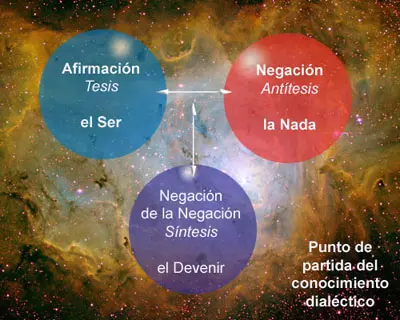The singular individual has to travel, in terms of their content, the phases of formation of the universal Spirit, but as figures already dominated by the Spirit, as stages of a path already laid out and paved. Hegel, Phenomenology
Hegel proposes through his system, to rebuild with thought, all reality. A reality that, in short, is thought, spirit, giving itself, in the end, a complete coincidence between the thought that thinks reality and the reality that is thought: the circle that is knotted with itself.
Starting from the simplest concept of all, building reality in its entirety even in its most complex aspects is the challenge that Hegel imposes with his program: if reality is not at its root, anything other than thought and the total and systematic thinking of all things we call it Idea, the system will be divided into three parts main (first example of dialectic triad):
1.1. Doctrine of Being
1.2. Doctrine of Essence
1.3. Doctrine of the Concept
2.1. Mechanics
2.2. Physics
2.3. Organic Physics
3.1. Subjective spirit
3.1.1. Anthropology (Soul)
3.1.2. Phenomenology of the Spirit (Consciousness)
3.1.3. Psychology (Spirit)
3.2. Objective spirit
3.2.1. Abstract Law
3.2.2. Moral
3.2.3. Ethics (Family, Civil Society, State)
3.3. Absolute Spirit
3.3.1. Art (The absolute in sensitive intuition)
3.3.2. Religion (The absolute in representation)
3.3.3. Philosophy (The absolute in the conceptual)
 Logic
Logic
If one can speak here of an intuition, there is nothing in being that this intuition can grasp, or, if he wants, the self is nothing but this pure and empty intuition. Nor is there anything in it that can be the object of a thought, or, if you will, it is nothing but this empty thought. Being immediate, indeterminate, is in fact nothing, nothing more and nothing less than nothing. Hegel, Science of Logic
—
—
— - Yeah.
Everyone takes the beautiful for the beautiful,
and that's why they know what ugly is.
Everyone takes good for good,
and that is why they know what evil is.
Because, being and non-being are begotten each other.
The easy and the difficult complement each other.
The length and the short form each other.
The high and the low are approaching.
Sound and tone harmonize with each other.
The before and the after follow each other.
Tao Te Ching, 2
—
— —
Hegel starts from the simplest notion: the concept is to be, since there is nothing more immediate and indeterminate. Everything, anything, whatever it is, is, everything participates in being. The starting point is, therefore, in the general being, pure and absolutely indeterminate: it is, in the end, nothing but an empty form of the affirmation by which nothing is affirmed.
However, when we ask ourselves what is being happens, nothing can be said about him. If something is tried to say about being, it turns out that in reality, it is limited to some form of being (a particular entity). Rigorously, of being can only be said... nothing
When talking about being, a second category appears, its opposite: nothing. Being vanishes when we try to grasp it and comes to mind its opposite. And so begins the dialectical movement.
Nor can something be said of nothing, since it is also pure indetermination. Hegel will consider them absolute opposites.
Being and nothingness are absolutely different but in turn, inseparable. Because trying to separate them, one vanishes into the other.
The truth between being and nothing lies in their reciprocal conversion. The passage from nothingness to being and from being to nothingness. That is, the becoming, synthesis in which being and nothingness are integrated and become meaningful. It is not a temporary becoming, yet nothing is said of time. The becoming is pure logical movement.
And so, synthesis, becomes the thesis of a new antithesis. Pure becoming is inconceivable, for it to exist, there must be something that becomes. The dialectical movement continues to seek a new synthesis more concrete and determined...